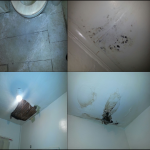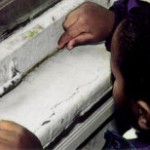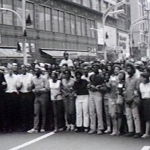 Today is International Women’s Day. On this day, women all across the world receive praises that go unsaid the rest of the year. It’s also a day for women like myself to reflect on what it means to be a woman, and how to stand better in solidarity with other women. Lately, I’ve been thinking about all the women that I’ve met throughout the years as a Healthy Homes Organizer and the struggles they’ve had to face. The story of Ms. May sticks out in my mind.
Today is International Women’s Day. On this day, women all across the world receive praises that go unsaid the rest of the year. It’s also a day for women like myself to reflect on what it means to be a woman, and how to stand better in solidarity with other women. Lately, I’ve been thinking about all the women that I’ve met throughout the years as a Healthy Homes Organizer and the struggles they’ve had to face. The story of Ms. May sticks out in my mind.
I first visited Ms. May this past January, to take a look at the peeling paint in her home and talk a bout how to prevent lead poisoning. When I arrived at the home, it immediately became clear that the situation was much worse than I had initially thought. There was ice on the staircase and a broken faucet, which had gone unchecked for nearly a week. That resulted in a giant ice rink near the house – a clear and present danger to Ms May. Inside the house, there was mold on the kitchen and bathroom walls and holes in the foundation. There were rat droppings from an infestation that had been inappropriately handled by her landlord, with serious consequences.
bout how to prevent lead poisoning. When I arrived at the home, it immediately became clear that the situation was much worse than I had initially thought. There was ice on the staircase and a broken faucet, which had gone unchecked for nearly a week. That resulted in a giant ice rink near the house – a clear and present danger to Ms May. Inside the house, there was mold on the kitchen and bathroom walls and holes in the foundation. There were rat droppings from an infestation that had been inappropriately handled by her landlord, with serious consequences.
Last October she asked her landlord to deal with the rat problem. The landlord, instead of hiring an exterminator,  had brought an unqualified person who ended up leaving a bag of rat poison pellets on top of the dining table. Her three-year-old daughter confused the brightly colored pellets for cereal and ended up ingesting some. Fortunately, the quick actions by Ms May resulted in a full recovery for her little girl. I bring this particular story up, because my initial reaction was to judge. How could someone leave rat poison on the table? How could she not realize that a young child might be attracted to the brightly colored pellets?
had brought an unqualified person who ended up leaving a bag of rat poison pellets on top of the dining table. Her three-year-old daughter confused the brightly colored pellets for cereal and ended up ingesting some. Fortunately, the quick actions by Ms May resulted in a full recovery for her little girl. I bring this particular story up, because my initial reaction was to judge. How could someone leave rat poison on the table? How could she not realize that a young child might be attracted to the brightly colored pellets?
It took me a few minutes before I checked myself and realized that situations like this were never that simple, and it usually was not the fault of one person. Ms May had done the best she could given her circumstances. It was her landlord who should have made the repairs, promptly and efficiently. But that did not happen. The exploitation of low-income tenants, in particular mothers and caretakers is something far too common in the housing market. Women in these situations more often than not have to take on the burden of child-rearing and making ends meet. Adding substandard housing further increases that burden, and the health consequences from inadequate housing are severe. We can’t make every home safe, but we can support the people living there.
So the question is, how do we become better allies? How do we, as fellow women, lessen t he burden of so many other Chicago women like Ms May? You can begin to stand in solidarity by calling your alderman and supporting the Chicago Healthy Homes Inspection Program that is designed to enforce building code standards and protect renters from health hazards. A move from the current building inspection system will help us prevent another story like Ms May’s and helps us in the effort to create safe housing for all. Healthy and thriving lives start at home, which is why every family should have safe, decent and accessible housing!
he burden of so many other Chicago women like Ms May? You can begin to stand in solidarity by calling your alderman and supporting the Chicago Healthy Homes Inspection Program that is designed to enforce building code standards and protect renters from health hazards. A move from the current building inspection system will help us prevent another story like Ms May’s and helps us in the effort to create safe housing for all. Healthy and thriving lives start at home, which is why every family should have safe, decent and accessible housing!
This story was written by Angelica Ugarte, Healthy Homes Program Organizer
We can start by communing with one another